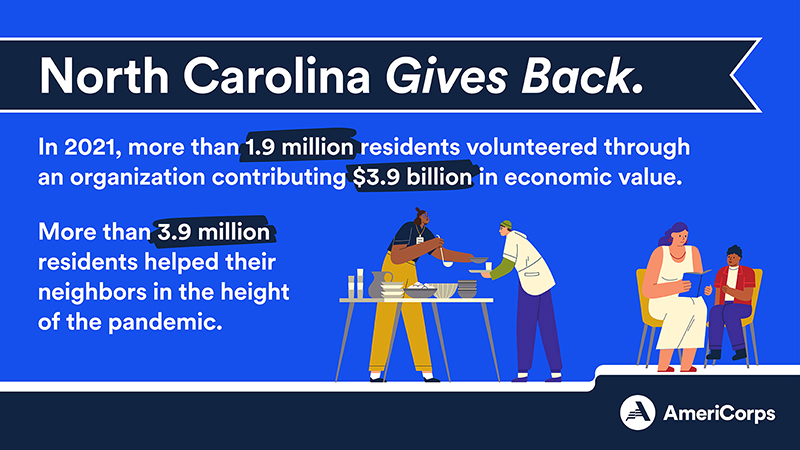People across the country continue to rally together during our nation’s most challenging times to help our neighbors. This isn’t new. But it is newsworthy. We’ve witnessed everyday people springing into action after the September 11 attacks, on every Martin Luther King Jr. Day of Service, after devastating natural disasters along our coasts and across the nation and, most recently, in the face of the COVID-19 pandemic.
The pandemic affected every aspect of our lives, strained public and nonprofit services, and exacerbated longstanding social inequities. Still, people came together, offering help and hope to their communities by supporting immunization clinics, staffing food banks, providing comfort to isolated seniors, and tutoring students to help them stay on track in school.
While volunteering did decline from 2020 to 2021, AmeriCorps and the U.S. Census Bureau’s Volunteering and Civic Life in America research underscores the value of giving time to help others in our communities across our states and nation. According to their research, half of Americans, or 124.7 million people of all ages and backgrounds, informally helped their neighbors at least once in the past year. From taking care of kids, to running errands, to simply lending a helping hand, our community showed up for one another during a time of need.
Additionally, more than 23 percent of Americans, or 60.7 million people, formally volunteered through community organizations, giving more than 4.1 billion hours of service with an estimated economic value of $122.9 billion.
In our home state, 22.8 percent of North Carolinians, or 1.9 million people, formally volunteered, contributing a total of 139.5 million hours of service. This means that NC volunteers provided the service equivalent of about 67,000 full time employees.

Informal volunteering was no less impressive across North Carolina:
- 97.7% of people talked to or spent time with friends or family
- 48.4% of people informally helped others by exchanging favors with their neighbors
- 68.9% of people had a conversation or spent time with their neighbors
Volunteers are essential to our nation’s economic and social well-being. What’s more, volunteering can benefit people’s own lives as an avenue to gain new skills, learn more about their communities, expand their network, connect with neighbors, and experience health benefits. Whether long-term, short-term, or just one time, volunteers’ commitment to supporting their communities makes a tremendous difference.
Check out these resources (and more in Information Central) for nonprofits to build a strong volunteer program and experience:
- Checklist for Building Better Volunteer Programs, North Carolina Center for Nonprofits
- The Smart Nonprofit’s Guide to Volunteer Management, Bloomerang
- 9 Ways to Boost Volunteer Morale, Volunteer Hub
Center members have access to volunteer experts for free consultations on legal, accounting, marketing, human resources, executive transition, and personal coaching issues through our Pro Bono Programs. Learn more.
